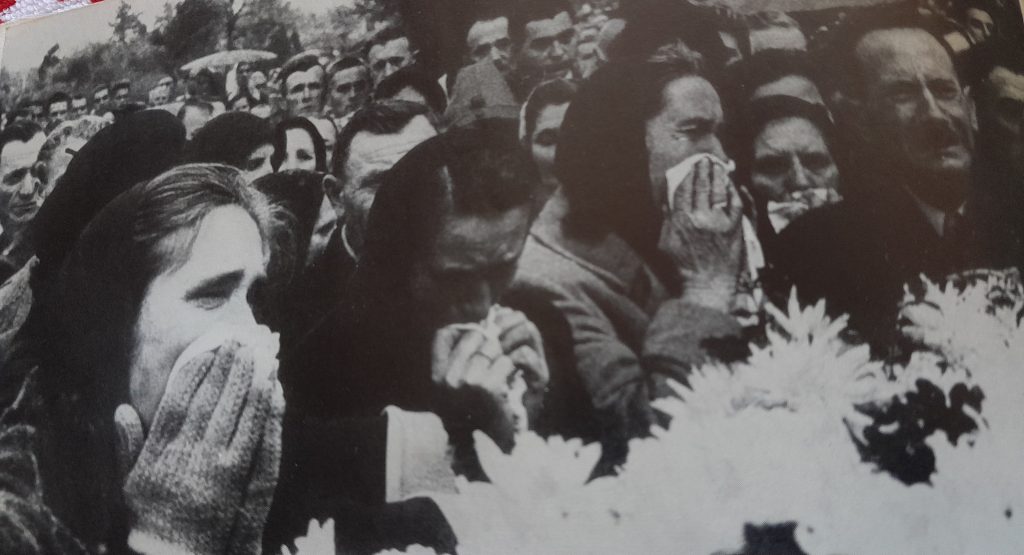I have lain down on the filthy floor,

My head leaning against the wall.
The pain….. perhaps stronger,
Than my poem?
I have been trying to recall the smile of my mother.
What I would like to do is pour
These poems over her soul,
This sobbing which has already lost its form.
Lord, now I own nothing else, and I will go along
With owning your face
Because of this only I have been able to endure it all:
On bread and water.
I have been keenly interested in the Hungarian Revolution of 1956 for quite some time. Pure goodness and heroism is a rarity in history. The existence of a clear, stark division between the morally good and the brazenly evil is rarer still. The Hungarian Revolution is an example of heroism, astounding sacrifice, and resistance to evil. It should be studied in all European schools, and beyond. For those reasons alone, this brief episode of history in the bloody and dismal Twentieth Century absolutely commands our interest, respect and admiration. What is more, because Hungary has such a rich tradition of literature, at this juncture, the poets of the past made common cause with the pens and the quest of the poets of 1956, and an unquenchable thirst for freedom generated a myriad of unforgettable poems as testimony to one of Europe’s greatest episodes and of the nobility of a valiant human spirit.
I came across a book called “ Down Fell the Statue Of Goliath “ some time ago, and it enraptured me from beginning to end. This book takes a distinctive perspective on the events of 1956. The author links the actions and resistance of the people of Budapest to their faith, their heritage, and their poetry. Faith and poetry kindled such a spirit of fortitude and sacrifice that it shocked and frightened a tyrannical empire at the height of its powers.
The poem that I have chosen is called On Bread and Water. I could have chosen so many. I will continue to write on this topic.
The story of the writer of this remarkable verse is told in a chapter of the book mentioned. In brief, Attila Gerecz was killed, perhaps a more befitting word would be murdered, by the Soviet occupying forces in 1956. The chapter begins by describing, with great poignancy, the scene at the flat in Budapest, of Attila’s mother as she, and his “ eternal fiancé” Marica , are brought the horrific news that Attila is no more.
This conjures a deeply moving, easily imagined motif of Christian belief underpinning this whole chapter. At this scene, I recalled the events and participants at the deposition and crucifixion, at which women risked their safety to show their love and lamentation; one for her son ,and one for her saviour Jesus Christ. The freedom fighters have brought Attila’s body home to seek assistance with the grisly business of burying him in the midst of bombings and shootings. The henceforth eternal fiancé is steadfast and defiant; she will accompany her beloved, her hero. Marica is indeed heartbroken, but magnificent to the end.
Attila must have been a remarkable young man. At 20 he was given a 12 year sentence by the communist government for “ conspiracy” In prison he wrote the poems that were to ensure his immortality. He was a sportsman and a daredevil too- a hero poet. One year into his sentence he impetuously decided to risk drowning, capture, and extreme reprisals from vengeful prison guards by escaping from his prison. He swam away from the prison and made it to land, he had escaped, briefly however, before being betrayed and given away to the communists. He was then re-captured, but he even earned the respect of the sadistic prison guards through his swashbuckling escapades.
In 1956, I believe due to the revolution, he was released, and, predictably, he joined the resistance. He was to enjoy eight days of freedom! This gladiator poet soon took up arms against the invaders. He demonstrated his extraordinary bravery and impetuousness during those terrifyingly unequal battles that took place in Budapest that pitted patriots against tanks. In his final, unequal confrontation with tyranny, he destroyed two tanks before being shot dead in the street by the one tank he had not managed to eliminate. Like Baczynski he gave his life in his nation’s death struggle and, like Baczynski, he is forever captured in youthful beauty by posterity.
“ I have been trying to recall the smile of my mother. “ He wrote, presumably when languishing in prison. I like to imagine he would have seen that smile again upon his release, perhaps the smile would be a cherished memory as he faced his cruel foes. I know not whether his mother would smile again ever, after the news of his death came to her.
At his burial, Marica recited his poems, On Bread and Water being one of those chosen. Such bravery she showed, to be able to compose oneself in the midst of crippling, numbing grief to read aloud the poems of your murdered beloved. Hungarians fought on against the communist tyranny with extraordinary tenacity, with bravery that is unparalleled. They were hugely inspired by their own literature, writers past and present forged a bond of action for liberty. Like the summoned phantoms of olden days appeared to ease the plight of Crusaders, the poets of Hungary came back to life to save the soul of their nation as it was being throttled by a totalitarian state once again.
Attila was buried in an improvised spot with the help of neighbours. At the unrehearsed funeral for Attila Marica whispered to her eternal fiancé “ I have not lost you, I will never lose you.” She and Hungary earned the right to smile again.



